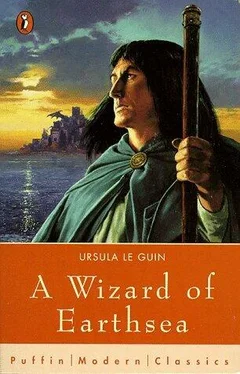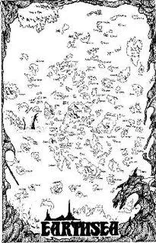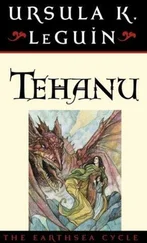Ursula Le Guin - A Wizard of Earthsea
Здесь есть возможность читать онлайн «Ursula Le Guin - A Wizard of Earthsea» весь текст электронной книги совершенно бесплатно (целиком полную версию без сокращений). В некоторых случаях можно слушать аудио, скачать через торрент в формате fb2 и присутствует краткое содержание. Жанр: Фэнтези, на английском языке. Описание произведения, (предисловие) а так же отзывы посетителей доступны на портале библиотеки ЛибКат.
- Название:A Wizard of Earthsea
- Автор:
- Жанр:
- Год:неизвестен
- ISBN:нет данных
- Рейтинг книги:5 / 5. Голосов: 1
-
Избранное:Добавить в избранное
- Отзывы:
-
Ваша оценка:
- 100
- 1
- 2
- 3
- 4
- 5
A Wizard of Earthsea: краткое содержание, описание и аннотация
Предлагаем к чтению аннотацию, описание, краткое содержание или предисловие (зависит от того, что написал сам автор книги «A Wizard of Earthsea»). Если вы не нашли необходимую информацию о книге — напишите в комментариях, мы постараемся отыскать её.
A Wizard of Earthsea — читать онлайн бесплатно полную книгу (весь текст) целиком
Ниже представлен текст книги, разбитый по страницам. Система сохранения места последней прочитанной страницы, позволяет с удобством читать онлайн бесплатно книгу «A Wizard of Earthsea», без необходимости каждый раз заново искать на чём Вы остановились. Поставьте закладку, и сможете в любой момент перейти на страницу, на которой закончили чтение.
Интервал:
Закладка:
From the Masters and from ancient lore-books Ged learned what he could about such beings as this shadow he had loosed; little was there to learn. No such creature was described or spoken of directly.
There were at best hints here and there in the old books of things that might be like the shadow-beast. It was not a ghost of human man, nor was it a creature of the Old Powers of Earth, and yet it seemed it might have some link with these. In the Matter of the Dragons, which Ged read very closely, there was a tale of an ancient Dragonlord who had come under the sway of one of the Old Powers, a speaking stone that lay in a far northern land. "At the Stone's command," said the book, "he did speak to raise up a dead spirit out of the realm of the dead, but his wizardry being bent awry by the Stone's will there came with the dead spirit also a thing not summoned, which did devour him out from within and in his shape walked, destroying men." But the book did not say what the thing was, nor did it tell the end of the tale. And the Masters did not know where such a shadow might come from: from unlife, the Archmage had said; from the wrong side of the world, said the Master Changer; and the Master Summoner said, "I do not know." The Summoner had come often to sit with Ged in his illness. He was grim and grave as ever, but Ged knew now his compassion, and loved him well. "I do not know. I know of the thing only this: that only a great power could have summoned up such a thing, and perhaps only one power – only one voice – your voice. But what in turn that means, I do not know. You will find out. You must find out, or die, and worse than die…" He spoke softly and his eyes were somber as he looked at Ged. "You thought, as a boy, that a mage is one who can do anything. So I thought, once. So did we all. And the truth is that as a man's real power grows and his knowledge widens, ever the way he can follow grows narrower: until at last he chooses nothing, but does only and wholly what he must do…'
The Archmage sent Ged, after his eighteenth birthday, to work with the Master Patterner. What is learned in the Immanent Grove is not much talked about elsewhere. It is said that no spells are worked there, and yet the place itself is an enchantment. Sometimes the trees of that Grove, are seen, and sometimes they are not seen, and they are not always in the same place and part of Roke Island. It is said that the trees of the Grove themselves are wise. It is said that the Master Patterner learns his supreme magery there within the Grove, and if ever the trees should die so shall his wisdom die, and in those days the waters will rise and drown the islands of Earthsea which Segoy raised from the deeps in the time before myth, all the lands where men and dragons dwell.
But all this is hearsay; wizards will not speak of it.
The months went by, and at last on a day of spring Ged returned to the Great House, and he had no idea what would be asked of him next. At the door that gives on the path across the fields to Roke Knoll an old man met him, waiting for him in the doorway. At first Ged did not know him, and then putting his mind to it recalled him as the one who had let him into the School on the day of his coming, five years ago.
The old man smiled, greeting him by name, and asked, “Do you know who I am?”
Now Ged had thought before of how it was always said, the Nine Masters of Roke, although he knew only eight: Windkey, Hand, Herbal, Chanter, Changer, Summoner, Namer, Patterner. It seemed that people spoke of the Archmage as the ninth. Yet when a new Archmage was chosen, nine Masters met to choose him.
“I think you are the Master Doorkeeper,” said Ged.
“I am. Ged, you won entrance to Roke by saying your name. Now you may win your freedom of it by saying mine.” So said the old man smiling, and waited. Ged stood dumb.
He knew a thousand ways and crafts and means for finding out names of things and of men, of course; such craft was a part of everything he had learned at Roke, for without it there could be little useful magic done. But to find out the name of a Mage and Master was another matter. A mage's name is better hidden than a herring in the sea, better guarded than a dragon's den. A prying charm will be met with a stronger charm, subtle devices will fail, devious inquiries will be deviously thwarted, and force will be turned ruinously back upon itself.
“You keep a narrow door, Master,” said Ged at last. “I must sit out in the fields here, I think, and fast till I grow thin enough to slip through”
“As long as you like,” said the Doorkeeper, smiling.
So Ged went off a little way and sat down under an alder on the banks of the Thwilburn, letting his otak run down to play in the stream and hunt the muddy banks for creekcrabs. The sun went down, late and bright, for spring was well along. Lights of lantern and werelight gleamed in the windows of the Great House, and down the hill the streets of Thwil town filled with darkness. Owls hooted over the roofs and bats flitted in the dusk air above the stream, and still Ged sat thinking how he might, by force, ruse, or sorcery, learn the Doorkeeper's name. The more he pondered the less he saw, among all the arts of witchcraft he had learned in these five years on Roke, any one that would serve to wrest such a secret from such a mage.
He lay down in the field and slept under the stars, with the otak nestling in his pocket. After the sun was up he went, still fasting, to the door of the House and knocked. The Doorkeeper opened.
“Master,” said Ged, “I cannot take your name from you, not being strong enough, and I cannot trick your name from you, not being wise enough. So I am content to stay here, and learn or serve, whatever you will: unless by chance you will answer a question I have.”
“Ask it.”
“What is your name?”
The Doorkeeper smiled, and said his name: and Ged, repeating it, entered for the last time into that House.
When he left it again he wore a heavy dark-blue cloak, the gift of the township of Low Torning, whereto be was bound, for they wanted a wizard there. He carried also a staff of his own height, carved of yew-wood, bronze-shod. The Doorkeeper bade him farewell opening the back door of the Great House for him, the door of horn and ivory, and he went down the streets of Thwil to a ship that waited for him on the bright water in the morning.
5. The Dragon of Pendor
West of Roke in a crowd between the two great lands Hosk and Ensmer lie the Ninety Isles. The nearest to Roke is Serd, and the farthest is Seppish, which lies almost in the Pelnish Sea; and whether the sum of them is ninety is a question never settled, for if you count only isles with freshwater springs you might have seventy, while if you count every rock you might have a hundred and still not be done; and then the tide would change. Narrow run the channels between the islets, and there the mild tides of the Inmost Sea, chafed and baffled, run high and fall low, so that where at high tide there might be three islands in one place, at low there might be one. Yet for all that danger of the tide, every child who can walk can paddle, and has his little rowboat; housewives row across the channel to take a cup of rushwash tea with the neighbor; peddlers call their wares in rhythm with the stroke of their oars. All roads there are salt water, blocked only by nets strung from house to house across the straits to catch the small fish called turbies, the oil of which is the wealth of the Ninety Isles. There are few bridges, and no great towns. Every islet is thick with farms and fishermen's houses, and these are gathered into townships each of ten or twenty islets. One such was Low Torning, the westernmost, looking not on the Inmost Sea but outward to empty ocean, that lonely corner of the Archipelago where only Pendor lies, the dragon-spoiled isle, and beyond it the waters of the West Reach, desolate.
Читать дальшеИнтервал:
Закладка:
Похожие книги на «A Wizard of Earthsea»
Представляем Вашему вниманию похожие книги на «A Wizard of Earthsea» списком для выбора. Мы отобрали схожую по названию и смыслу литературу в надежде предоставить читателям больше вариантов отыскать новые, интересные, ещё непрочитанные произведения.
Обсуждение, отзывы о книге «A Wizard of Earthsea» и просто собственные мнения читателей. Оставьте ваши комментарии, напишите, что Вы думаете о произведении, его смысле или главных героях. Укажите что конкретно понравилось, а что нет, и почему Вы так считаете.










